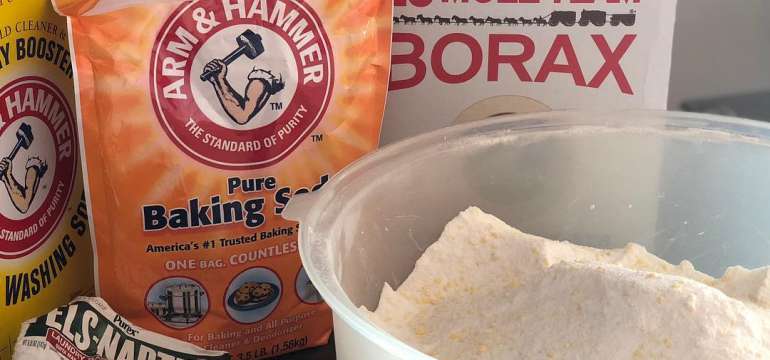Did you know that your dishwasher gets dirty? You might not think about it, because it might seem like your dishwasher should be able to keep itself clean thanks to regular use. But now and then, it is a good idea to give the dishwasher a good cleaning treatment of its own. There are various products you can use to accomplish a thorough cleaning of your appliance, and one of the most accessible and commonly used minerals for this purpose is borax.
Is Borax Safe to Use in the Dishwasher?
 If you are not familiar with borax, you may question its use in proximity to the dishes from which your family will be eating. You may wonder if borax is even safe to use in your kitchen appliance. However, rest assured that borax is definitely safe to use in the dishwasher. You can even use it in there when you have dishes inside. It will not hurt the dishes at all or make them unsafe for people to use. In fact, the presence of the borax during the wash cycle will probably make your glassware sparkle more than usual!
If you are not familiar with borax, you may question its use in proximity to the dishes from which your family will be eating. You may wonder if borax is even safe to use in your kitchen appliance. However, rest assured that borax is definitely safe to use in the dishwasher. You can even use it in there when you have dishes inside. It will not hurt the dishes at all or make them unsafe for people to use. In fact, the presence of the borax during the wash cycle will probably make your glassware sparkle more than usual!
Borax is actually a fairly gentle substance. It is environmentally safe, and it does not tend to irritate human skin. Plus, when you use it in the dishwasher during a cycle, it all gets thoroughly rinsed away, so you do not have to worry about residue being ingested.
Borax vs. Boric Acid
When people have questions about the safety of borax, it is often because they are confusing it with boric acid. Boric acid results when regular borax reacts with hydrochloric acid or sulfuric acid. Boric acid’s safety is another question entirely, and you can research that if you are curious, but borax itself is perfectly harmless when used as a cleansing agent. Technically it is called sodium tetraborate. It is a kind of mineral salt that is taken from the ground.
Borax is typically rated as a level 1 health hazard, which is very low-risk, on the same level as salt and baking soda. It is not allowed as a food additive, however. In certain quantities, it could be a skin irritant, but any reaction would be very mild, and when it is used as a cleaner, with water, there is no risk of even a mild reaction. In addition, borax does not build up in the human system over time.
Borax is toxic if ingested in large amounts, in the same way that salt would be. If you swallowed a lot of it, it would first cause stomach issues and nausea, and in even higher amounts, it could be dangerous. But we are talking about very high amounts here. In tiny amounts, boron is actually an essential mineral, vital for plant growth, and found in trace amounts throughout your diet. And as a natural substance, borax (not boric acid) works very well as a cleaning additive.
How to Use Borax in the Dishwasher
 To use borax in the dishwasher as a cleaning agent, first load up the dishwasher with dirty dishes. Then add a quarter cup of powdered borax in the bottom of the dishwasher. Include a packet or measured amount of your usual dishwasher detergent in the compartment provided for the soap. Then close the dishwasher and run it as normal on a regular cycle.
To use borax in the dishwasher as a cleaning agent, first load up the dishwasher with dirty dishes. Then add a quarter cup of powdered borax in the bottom of the dishwasher. Include a packet or measured amount of your usual dishwasher detergent in the compartment provided for the soap. Then close the dishwasher and run it as normal on a regular cycle.
You can also run the dishwasher empty with just the borax in it once a month to give it a good cleaning. For this type of cycle, use half a cup of borax, double the amount you would use if you were running the dishwasher with soap and a full load of dishes. After adding the half cup of borax, set the dishwasher for a quick hot cycle, and run it. You will find that doing this regularly keeps all the parts and nooks of your appliance clean.
Another good trick is to use a little citric acid in the dishwasher. The citric acid will cut through layers of grease and grime and take some of the stress off the dishwasher. You can also try a cup of vinegar in the dishwasher occasionally. It helps to thoroughly rinse dishes, and it can aid with keeping the appliance clean and functional.
Borax for Pest Control
If you have an issue with pests creeping into your appliances, you can use borax in the dishwasher for ants. More commonly, borax can be sprinkled all around a dishwasher or washing machine or dryer or any other appliance that seems to be attracting roaches, ants, or other pests.
- Using Borax in the Dishwasher - May 27, 2020
- Towel Ring Height and Other Fixtures: Proper Measurements - May 1, 2020
- Homemade Paint Removers for Every Surface - April 27, 2020
